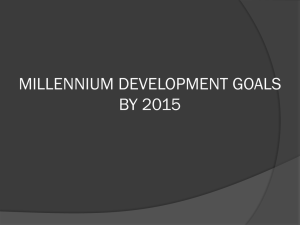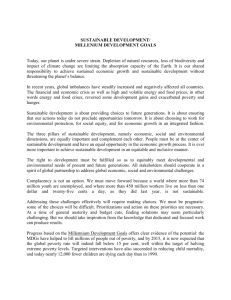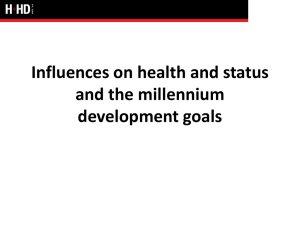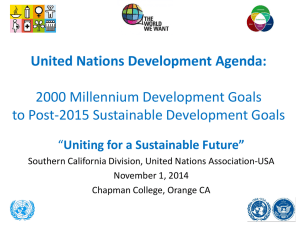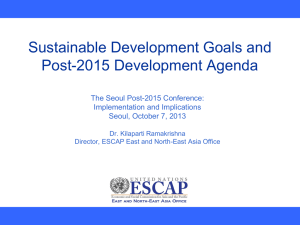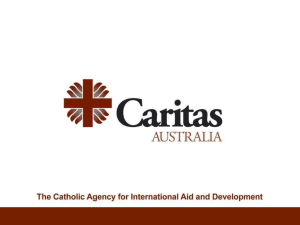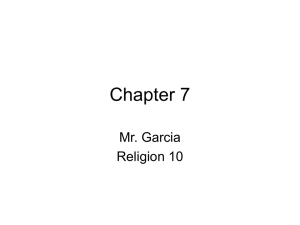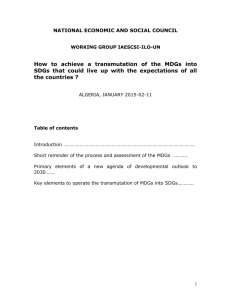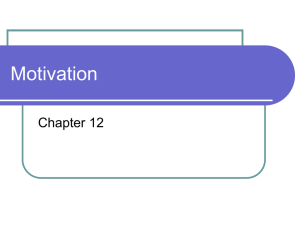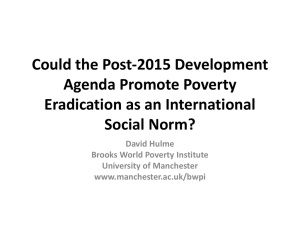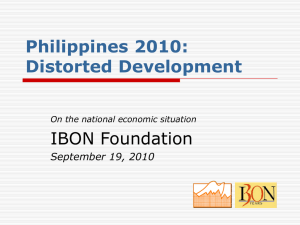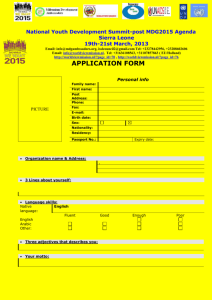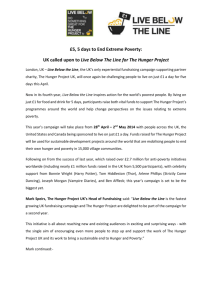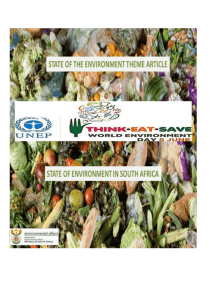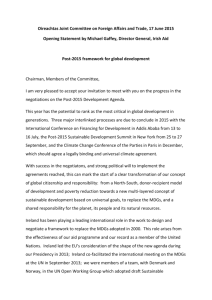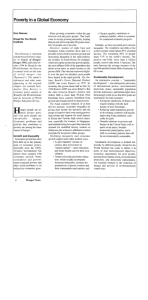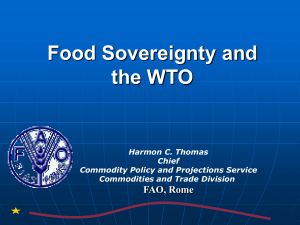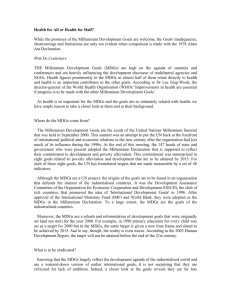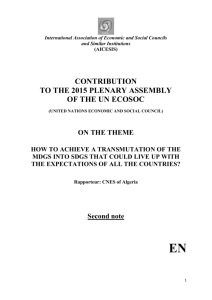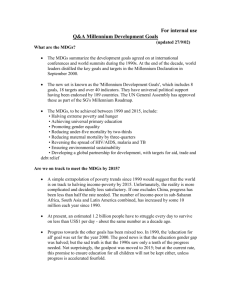IBON International Post 2015 Submission on Food
advertisement
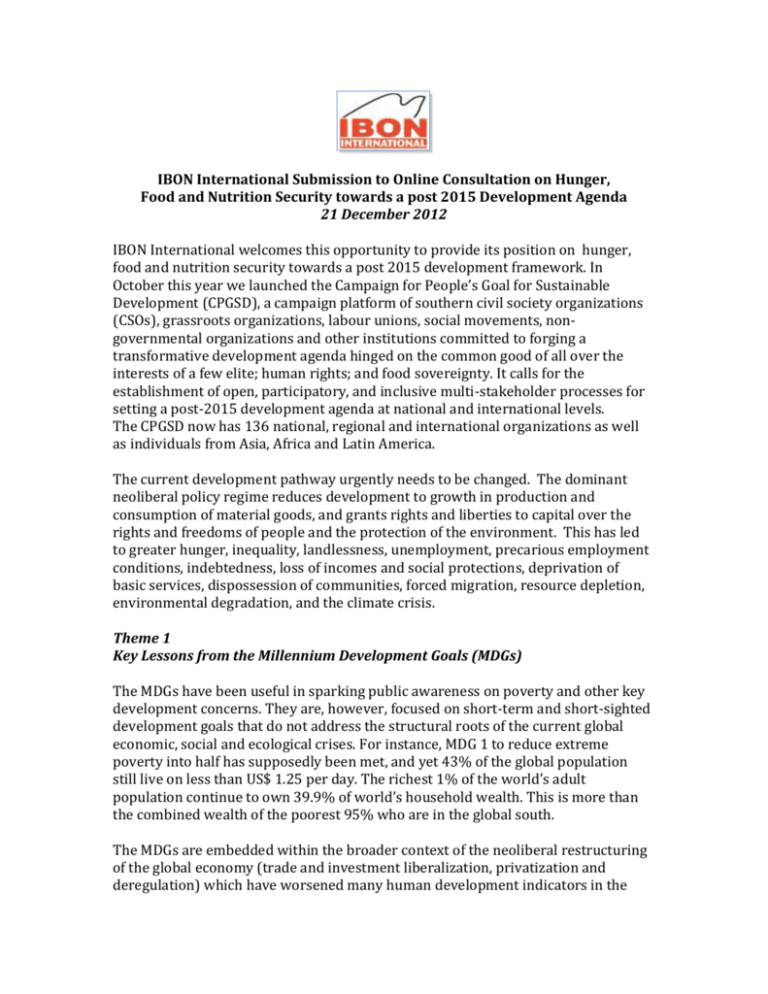
IBON International Submission to Online Consultation on Hunger, Food and Nutrition Security towards a post 2015 Development Agenda 21 December 2012 IBON International welcomes this opportunity to provide its position on hunger, food and nutrition security towards a post 2015 development framework. In October this year we launched the Campaign for People’s Goal for Sustainable Development (CPGSD), a campaign platform of southern civil society organizations (CSOs), grassroots organizations, labour unions, social movements, nongovernmental organizations and other institutions committed to forging a transformative development agenda hinged on the common good of all over the interests of a few elite; human rights; and food sovereignty. It calls for the establishment of open, participatory, and inclusive multi-stakeholder processes for setting a post-2015 development agenda at national and international levels. The CPGSD now has 136 national, regional and international organizations as well as individuals from Asia, Africa and Latin America. The current development pathway urgently needs to be changed. The dominant neoliberal policy regime reduces development to growth in production and consumption of material goods, and grants rights and liberties to capital over the rights and freedoms of people and the protection of the environment. This has led to greater hunger, inequality, landlessness, unemployment, precarious employment conditions, indebtedness, loss of incomes and social protections, deprivation of basic services, dispossession of communities, forced migration, resource depletion, environmental degradation, and the climate crisis. Theme 1 Key Lessons from the Millennium Development Goals (MDGs) The MDGs have been useful in sparking public awareness on poverty and other key development concerns. They are, however, focused on short-term and short-sighted development goals that do not address the structural roots of the current global economic, social and ecological crises. For instance, MDG 1 to reduce extreme poverty into half has supposedly been met, and yet 43% of the global population still live on less than US$ 1.25 per day. The richest 1% of the world’s adult population continue to own 39.9% of world’s household wealth. This is more than the combined wealth of the poorest 95% who are in the global south. The MDGs are embedded within the broader context of the neoliberal restructuring of the global economy (trade and investment liberalization, privatization and deregulation) which have worsened many human development indicators in the region. The continuing food crises dramatically underscored in 2008 and 2011 show that any so-called gain in meeting the targets are easily lost and eroded due to failure to address the roots of poverty and underdevelopment. Process-wise, the MDGs were not defined by its supposed beneficiaries. The MDGs were set by the UN with strong participation from northern countries and donors but without involvement from the people. Countries of the south have become mere implementors of said goals. Democratic ownership is fundamental in formulating policies and programs owned by the people. Finally, accountability mechanisms have been confined to state executives reporting to donors and donor governments. Mechanisms for the people to hold their governments to account for failing to meet the targets are absent. Theme 2 What works best? Future key issues? Governments and the international community must adopt concrete commitments and targets, consistent with the principle of common but differentiated responsibilities and respective capacities, on the following peoples’ priorities: human rights; poverty and inequality; food sovereignty; full employment and decent work; universal social protection; gender justice; climate justice and environmental sustainability; new trade, financial and monetary architecture; democracy and good governance; and peace and security based on justice. Specific to hunger, food and nutrition security, food sovereignty must be adopted as a policy framework towards adequate, safe, nutritious food for all, including policies and investments to support small-scale farmers, women producers, workers and secure access to (and protection of) the water, land, soils, biodiversity, and other resources upon which food security depends. Agrarian reform is integral to this in order to secure workers’, farmers’ and rural people’s democratic access to land, water resources and seeds. There must be support in the form of finance and infrastructure in line with, but not limited to, the recommendations of the 2006 International Conference on Agrarian Reform and Rural Development. Theme 3 Objectives, Targets and Indicators for a Post 2015 Development Framework A transformative development agenda requires a radical redistribution of ownership, access and control over productive resources. It involves the democratization of state and social institutions so that communities and citizens, rather than markets can democratically set social goals and priorities. It requires a reorientation of production and consumption to meet people’s needs and human potentials within environmental limits rather than maximizing short-term profits. Specific objectives set in the zero hunger challenge -- 100% access to adequate food all year round ; zero stunted children less than two (2) years old; sustainability of all food systems; 100% increase in smallholder productivity and income; and zero loss or waste of food – while significant are again, short-term development goals that do not address structural causes of poverty, hunger and malnutrition. Sustainable development goals in a post 2015 development framework to be effective must be transformational, operationable and monitorable. Important indicators could be: poverty reduction; women participation; equality (building on Gini coefficient); decent work; social protection especially for youth and children; self-reliant economic development, among others. Claiming Right to Participate The ongoing process of establishing a new set of sustainable development goals and a post-2015 development framework should recognize and provide full mechanisms and opportunities for full participation of civil society in deliberations and decisionmaking at all levels. At the national level, multistakeholder bodies should be formed with representatives from the government (including parliament and local authorities), civil society and other stakeholders to decide on national development strategy and priority targets based on local consultations with experts’ inputs. At the international level, multistakeholder processes led by Task Teams under the Open Working Group on Sustainable Development Goals can be set up where member governments and representatives of civil society and other stakeholders can formally meet and work side-by-side to draft proposals for the General Assembly. These modalities should include providing adequate support for the participation of those directly affected and most vulnerable to poverty, inequality, injustice, ecological destruction and human rights violations, especially from the Global South. # Sources: 1. “SDGs: Can they promote sustainable development?”, IBON International Policy Brief, June 2012 2. “Reforming Global Sustainable Development Governance: A Rights-Based Agenda”, IBON International Policy Brief, March 2012 3. “Monopoly Capitalism and the Ecological Crisis”, IBON International Primer, 2012
